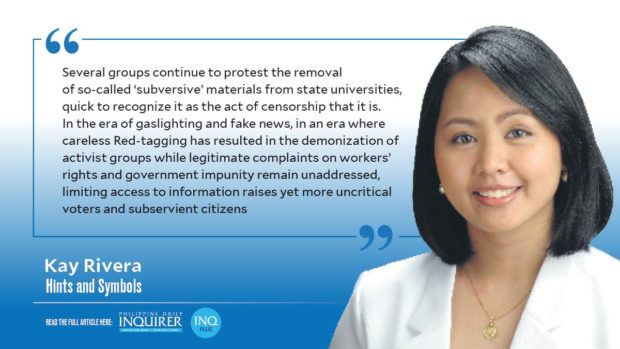‘Bayan Ko’
Several groups continue to protest the removal of so-called “subversive” materials from state universities, quick to recognize it as the act of censorship that it is. In the era of gaslighting and fake news, in an era where careless Red-tagging has resulted in the demonization of activist groups while legitimate complaints on workers’ rights and government impunity remain unaddressed, limiting access to information raises yet more uncritical voters and subservient citizens.
I used to think that book burning, or at the very least book banning, was no longer a thing: something belonging to cautionary tales in literature, like Ray Bradbury’s “Fahrenheit 451,” or to the past, when emperors burned books as an act of conquest, or when Nazis did their own purges of literature considered contrary to Nazi ideologies. I also knew book burning, in a more figurative form, was part of our recent past; I read of books and songs that were banned during the Marcos regime for being too “subversive.” It seems ludicrous that the banning of literature should still be a thing of the present, and yet here we are. On top of the removal of materials from local state universities, the banning of literature persists elsewhere: In North Kansas City, two LGBTQ-themed books, considered “inappropriate,” were recently pulled out from North Kansas City schools. A Texas representative recently launched an investigation into local school districts to see if libraries carry certain books on a number of topics ranging from sexuality to racism.
On a related note, musing on banned literature leads me to think about the song “Bayan Ko,” a song that enjoyed a lot of popularity at the time of the 1986 Edsa People Power Revolution, and which had become a sort of anthem for the struggle before the dictator Ferdinand Marcos’ ouster. The song was originally written for a zarzuela, and the Filipino lyrics we now know were written by poet Jose Corazon de Jesus. The song, with its patriotic sentiments against occupation, gained popularity among activists as a protest song, and was banned from airplay during the Marcos regime; it continued to be sung underground and in prisons and was later popularized by Freddie Aguilar. (Ceres P. Doyo talks about one such treasured compilation of prison songs, “Ibong Malaya,” in “Songs of protest, songs of love,” Human Face, 9/27/12). Teresita Gimenez Maceda wrote in 2007: “It was the only kundiman sung with clenched fists that had the affective power to consolidate protest marchers, and make them hold their lines in the face of the water cannons, tear gas and truncheons used for violent dispersals.”
Years later it would be the stuff of Buwan ng Wika singing contests and we, the children who sang it, were usually ignorant of its militant context. It was a yearly source of bewilderment for me that my classmates did not know the coda that I had learned from the “Ibong Malaya” tapes:
“Kay sarap mabuhay sa sariling bayan / Kung walang alipin, at may kalayaan. / Ang bayang sinisiil, babangon lalaban din / Ang Silanga’y pupula sa timyas ng paglaya.” (Another version I have since read has a different, more mournful first couplet: “Kay hirap mabuhay sa sariling bayan / Kung ika’y alipin ng mga dayuhan.”) The tapes we listened to in school in the 1990s and 2000s did not have such a verse. Also, the chorus known to my friends was “Ibon mang may layang lumipad / Kulungin mo at umiiyak,” while I had grown up singing “Kulungin mo at pumipiglas.”
It took me several years to find out, through titbits in newspaper articles, books, and Filipino blogs, that the version of “Bayan Ko” I had grown up singing was a more militant version of the revived song. José B. Capino wrote in his 2020 book, “Martial Law Melodrama,” that the changes were “added by activists during the 1970s.” The argument, it seemed, was that a caged bird could not free itself by merely crying; it must struggle and set itself free, hence the conversion of “pumipiglas” from “umiiyak” for at least one chorus, and hence the addition of the coda and its suggestive lyrics of the east turning red and the nation’s uprising. Some did call the changes inflammatory, a “bastardization” of the original lyrics, but certainly this was the version known to many a protester.
The popularity of the verses did not endure; the record cut by Freddie Aguilar is relatively tame, some even say watered down, and now the song is more Buwan ng Wika standard fare than call to sedition. Every time I think of it, however, I compare how we can now sing the song quite freely, while our parents and those who struggled under the dictatorship could only sing in hushed voices, could only pass around cassette tapes of the song recorded in prison bathrooms or abroad. I consider how history repeats itself, and how the freedoms won by one generation may again be snatched from another. Let us take care: the controlling of access to books and art is one step away from controlling freedom of thought.





















